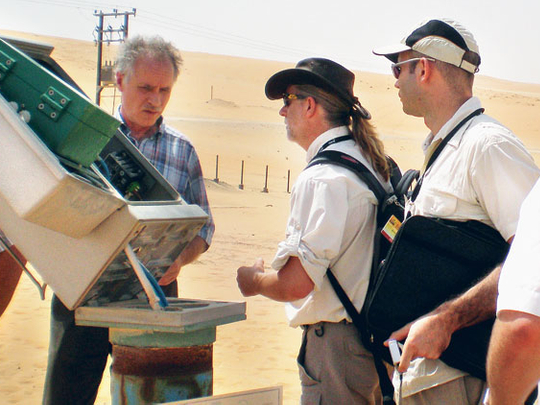
Liwa: Abu Dhabi's underground water storage projects — to serve as strategic water reserves for emergency situations — will be able to store potable water for a long time; even up to a thousand years, an expert has said.
"The water injected in the aquifers does not need to be replaced frequently. Even if the water is kept for a thousand years, its quality will not be affected," Dr George Koziorowski, Chief Hydrologist at gtz International Services, told Gulf News during a field trip to the Aquifer storage and recovery (ASR) project site in Liwa on Wednesday.
He was accompanied by delegates attending the seventh International Symposium on Managed Aquifer Recharge (ISMAR7) which concluded in the capital on Wednesday.
According to the Environment Agency Abu Dhabi (EAD), which is implementing the $5 billion (Dh18.37 billion) project, the ASR technique involves injecting fresh water into an aquifer by using wells or infiltration basins for creating a sub-surface water supply.
This water supply, which is recovered at a later stage, helps meet seasonal and long-term needs and in times of an emergency or a natural crisis.
Mohammad A. Dawoud, Manager, Water Resources Department at EAD cites an example.
The maximum water stored in the ground reservoirs and distribution network [in GCC countries] is enough only for 24 hours, except in Saudi Arabia and Kuwait, where it suffices for three to five days respectively, he said.
Thus, in any crisis or emergency, the stored water will not be enough to meet demand, hence the need to explore the ASR technique, Dawoud said.
Ensuring availability
Koziorowski added that previous plans sought to connect the project with a distribution network and frequently replace it with fresh water. "But later we found that the water stored in the ‘shallow dunes sand aquifers' in Liwa will be safe for long time," he said.
The project, set to be ready after two and a half years, will be able to provide water to the distribution network within 24 hours.
Peter J. Menche, Project Director at gtz explains that the injected water will be mixed with natural fresh water [which is saline] without affecting the quality.
"The salinity of underground water is up to 1,000 ppm [parts per million] but when we inject the desalinated fresh water of 250 ppm, the average salinity will be around 400 ppm," he said. In its final stage the salinity may go up to 580 ppm, but will still be potable as per our standards, Menche said.
Experst added that in Europe certain mineral waters have a 1,100 ppm. "So the salinity of water from this project is not an issue," they said., adding that the recovery rate of the water is 85 per cent.
Abu Dhabi's two pilot water storage projects
EAD is currently implementing two pilot projects in water resources strategic reserves, in Al Shuweib and Liwa, in cooperation with Abu Dhabi Water and Electricity Authority, Abu Dhabi Distribution Company (ADDC) and Al Ain Distribution Company.
After the success of the pilot project in Liwa, the Abu Dhabi Executive Council agreed to implement an integrated project for strategic water reserves using the Aquifer Storage and Recovery (ASR) which injects desalinated water into aquifers to ensure adequate water supply during emergency conditions. The first phase is scheduled to be completed by 2012.
In numbers
First phase (to be completed by 2012)
7 million imperial gallons a day – injection rate
40 million imperial gallons a day – recovery rate
Second phase
10 million imperial gallons a day- injection rate
100 million imperial gallons a day- recovery rate
Initiative: Key advantages
The underground reservoirs (aquifers) does not use large plots of land compared to other alternatives and saves a great deal on storage costs.
The land required for building surface storage facilities was reduced from 250 to 15 hectares, while costs of infrastructure needed to store one gallon of water were reduced from Dh3.5 to eight fils.
Operational and maintenance costs were also reduced from Dh1.5 to 25 fils per gallon.
Source: Environment Agency Abu Dhabi (EAD)
What do you think of this technology? Do you know of any other successful water harvesting methods?












